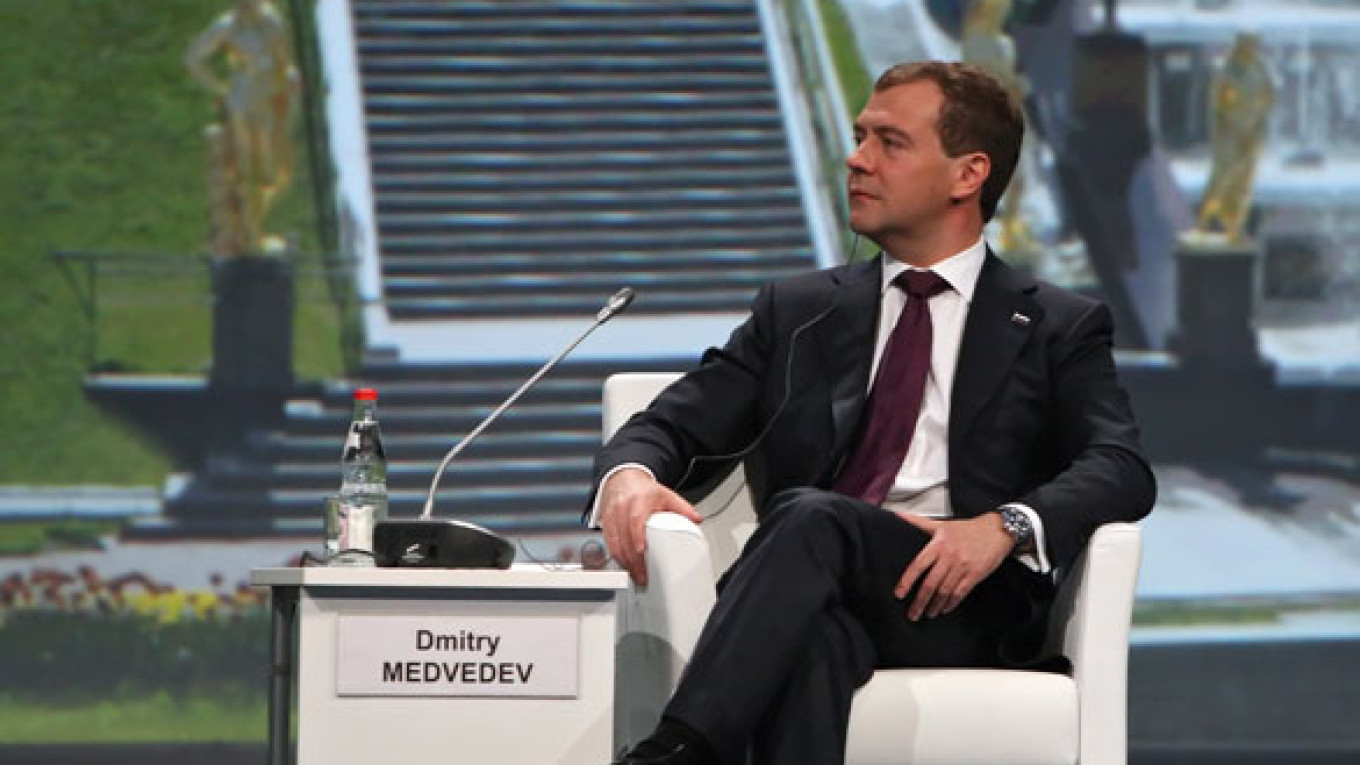ST. PETERSBURG — President Dmitry Medvedev on Friday said tax breaks, foreign investment and the privatization of some state enterprises are key to modernizing the economy and reducing reliance on oil.
The reliance on oil and gas — which account for some 60 percent of budget revenues — meant that Russia felt the global crisis much more deeply than most of its emerging market peers, witnessing the deepest economic slump in 15 years in 2009.
Medvedev, halfway through his presidency, has made modernization his main cause, launching a project to build Russia's answer to Silicon Valley, the Skolkovo innovation city, and securing some tax breaks for innovation companies.
"No matter how many state-owned companies we have, modernization will happen, above all, through private businesses, and only if there is competition," Medvedev told the St. Petersburg Economic Forum, Russia's biggest annual event for top domestic and global policymakers and company executives.
Medvedev has ruled to slash the number of Russia's strategic companies — ones which cannot be privatized and ones in which foreign investment is complicated — fivefold.
"The state should not tear the apples from the tree of economics. What the government should do is help to grow our apple orchard, develop our economic environment," he said.
"In hothouse conditions, nothing will grow."
Other initiatives unveiled so far include plans for tax breaks for innovation companies and education institutions, as well as scrapping capital gains tax on long-term investments.
On Friday, Medvedev also called for the creation of a new investment fund focusing on modernization, where the state cash will be supplemented by greater sums from the private sector.
Arkady Dvorkovich, the Kremlin's top economic aide, told Reuters on Thursday that Russia hopes to double foreign direct investment in 3 to 4 years and increase domestic capital investment to 20 percent of GDP.
Some investors seemed to be buying the pitch. Food group Danone and Russia's Unimilk have agreed to merge their fresh dairy product businesses in the CIS area in a move that the French company hopes will boost its growth in the booming market.
However, oil still remained a key focus at the forum, with Total saying it was looking into new projects with LUKoil. And in Moscow on Thursday, Chevron signed a deal with Russia's Rosneft to develop a Russian field.
The tone of the speech was more upbeat than last year, when Russia was in the grip of the financial crisis. But Medvedev remained cautious about the recovery.
"We started this year with growth. [But] for now, the pace of this growth is not as inspirational as we would like. ...We need to increase the efforts of the state," he said.
Russia's economy is expected to grow by about 4 percent this year, recovering close to half of last year's contraction.
If growth does recover, Russia could further stimulate investment and innovation through tax cuts.
"We must work so that the social measures to defend the most weak do not restrain the progress of the strongest. We have the possibility not to increase the tax burden in addition to the decisions already known," Medvedev said.
"With favorable conditions of recovery in the global and Russian economies, in the coming years we will return to the question of general tax cuts for business."
Get Twitter updates from Moscow Times reporters at the St. Petersburg International Economic Forum.
A Message from The Moscow Times:
Dear readers,
We are facing unprecedented challenges. Russia's Prosecutor General's Office has designated The Moscow Times as an "undesirable" organization, criminalizing our work and putting our staff at risk of prosecution. This follows our earlier unjust labeling as a "foreign agent."
These actions are direct attempts to silence independent journalism in Russia. The authorities claim our work "discredits the decisions of the Russian leadership." We see things differently: we strive to provide accurate, unbiased reporting on Russia.
We, the journalists of The Moscow Times, refuse to be silenced. But to continue our work, we need your help.
Your support, no matter how small, makes a world of difference. If you can, please support us monthly starting from just $2. It's quick to set up, and every contribution makes a significant impact.
By supporting The Moscow Times, you're defending open, independent journalism in the face of repression. Thank you for standing with us.
Remind me later.


